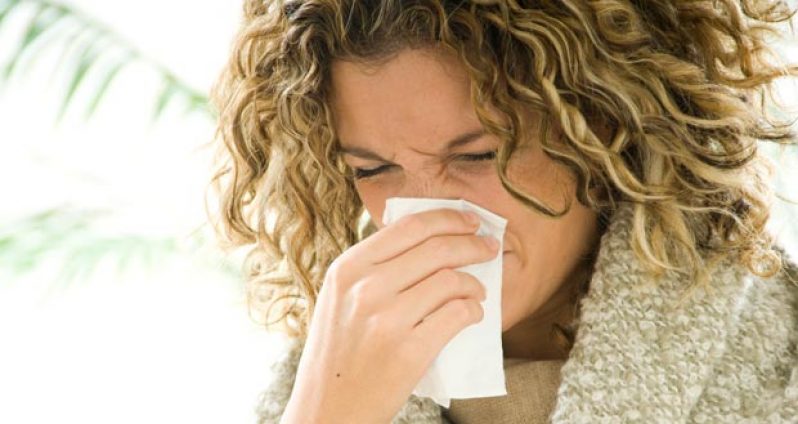MAYBE I shouldn’t speak too soon, but I haven’t had a cold in the last thirteen months. For someone who has always had an annual cold from ever since, I’m delighted to reach the month of December without one.
We expose our bodies to the cold virus just by stepping out our front door. There is the public transportation, telephones at work, doorknobs, or maybe your job will put you in close contact with persons who have the cold.
The common cold is one of the commonest illnesses in humans, and is also one of the commonest causes of work and school absenteeism. Over 200 different viruses can cause cold symptoms of varying severity.
Viruses that cause colds are spread from person to person through tiny droplets of mucus that enter the air from the nasal passages of infected persons and are inhaled by others. Colds can also be spread by touching surfaces that have been contaminated by contact with infected persons and then touching your mouth, nose, or eyes.
While it is impossible to completely prevent the spread of colds, there are steps you can take to reduce the chances of you or a family member becoming infected with a virus that causes colds:
• Wash your hands often. This is probably the single best measure to prevent transmission of colds; especially after shopping, going to the gym, or spending time in public places. Hand washing is critical. Frequent hand washing can destroy viruses that you have acquired from touching surfaces used by other people. You can also carry a small tube of hand sanitizer or sanitizing hand wipes when visiting public places. Teach your children the importance of hand washing too.
• Avoid touching your face, especially the area around the nose, mouth, and eyes, if you are around someone with a cold, or have been touching surfaces in a public area.
• Do not smoke. Cigarette smoke can irritate the airways and increase susceptibility to colds and other infections. Even exposure to passive smoke can make you (or your children) more vulnerable to colds. Statistics show that heavy smokers get more severe colds more frequently. Even being around smoke profoundly zaps the immune system. Smoke dries out your nasal passages and paralyzes cilia. These are the delicate hairs that line the mucous membranes in your nose and lungs, and with their wavy movements sweep cold and flu viruses out of the nasal passages. Experts contend that one cigarette can paralyze cilia for as long as 30 to 40 minutes.
• Use disposable items if someone in your family is infected. Disposable cups can be thrown away after each use, and prevent accidental spread of the virus from sharing of cups or glasses. This is particularly important if you have young children who may try to drink from the cups of others.
• Keep household surfaces clean. Door knobs, drawer pulls, keyboards, light switches, telephones, remote controls, countertops, and sinks can all harbour viruses for hours after their use by an infected person. Wipe these surfaces frequently with soap and water, or a disinfectant solution.
• If your child has a cold, wash his or her toys as well when you are cleaning household surfaces and commonly-used items.
• Use paper towels in the kitchen and bathroom for hand washing. Germs can live for several hours on cloth towels. Alternatively, have separate towels for each family member, and provide a clean one for guests.
• Throw tissues away after use. Used tissues are sources of virus that can contaminate any surface where they are left.
• Maintain a healthy lifestyle. While there isn’t direct evidence to show that eating well or exercising can prevent colds, maintenance of a healthy lifestyle — with adequate sleep, good nutrition and physical exercise — can help ensure that your immune system is in good condition and ready to fight infection if it occurs.
• Control stress. Studies have shown that people experiencing emotional stress have weakened immune systems, and are more likely to catch a cold than their calmer counterparts.
• Don’t cover your sneezes and coughs with your hands. Because germs and viruses cling to your bare hands, muffling coughs and sneezes with your hands often results in passing along your germs to others. When you feel a sneeze or cough coming, use a tissue, then throw it away immediately. If you don’t have a tissue, cough or sneeze into the inside of your elbow.
• Do aerobic exercise regularly. Aerobic exercise speeds up the heart to pump larger quantities of blood; makes you breathe faster to help transfer oxygen from your lungs to your blood; and makes you sweat once your body heats up. These exercises help increase the body’s natural virus-killing cells.
• Eat foods containing phyto-chemicals. “Phyto” means plants, and the natural chemicals in plants give the vitamins in food a supercharged boost. So put away the vitamin pill, and eat dark green, red, and yellow vegetables and fruits.
• Cut alcohol consumption. Heavy alcohol use suppresses the immune system in a variety of ways. Heavier drinkers are more prone to initial infections as well as secondary complications. Alcohol also dehydrates the body — it actually causes more fluid loss from your system than it puts in.
(By Michelle Gonsalves)












